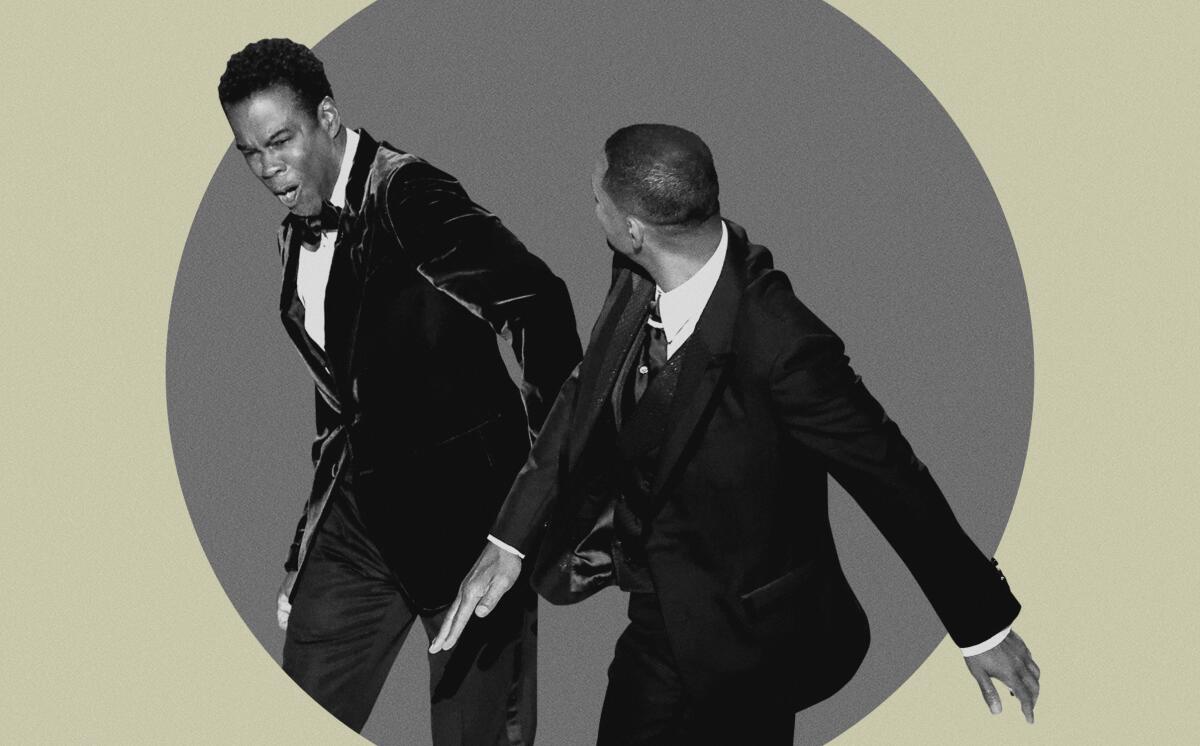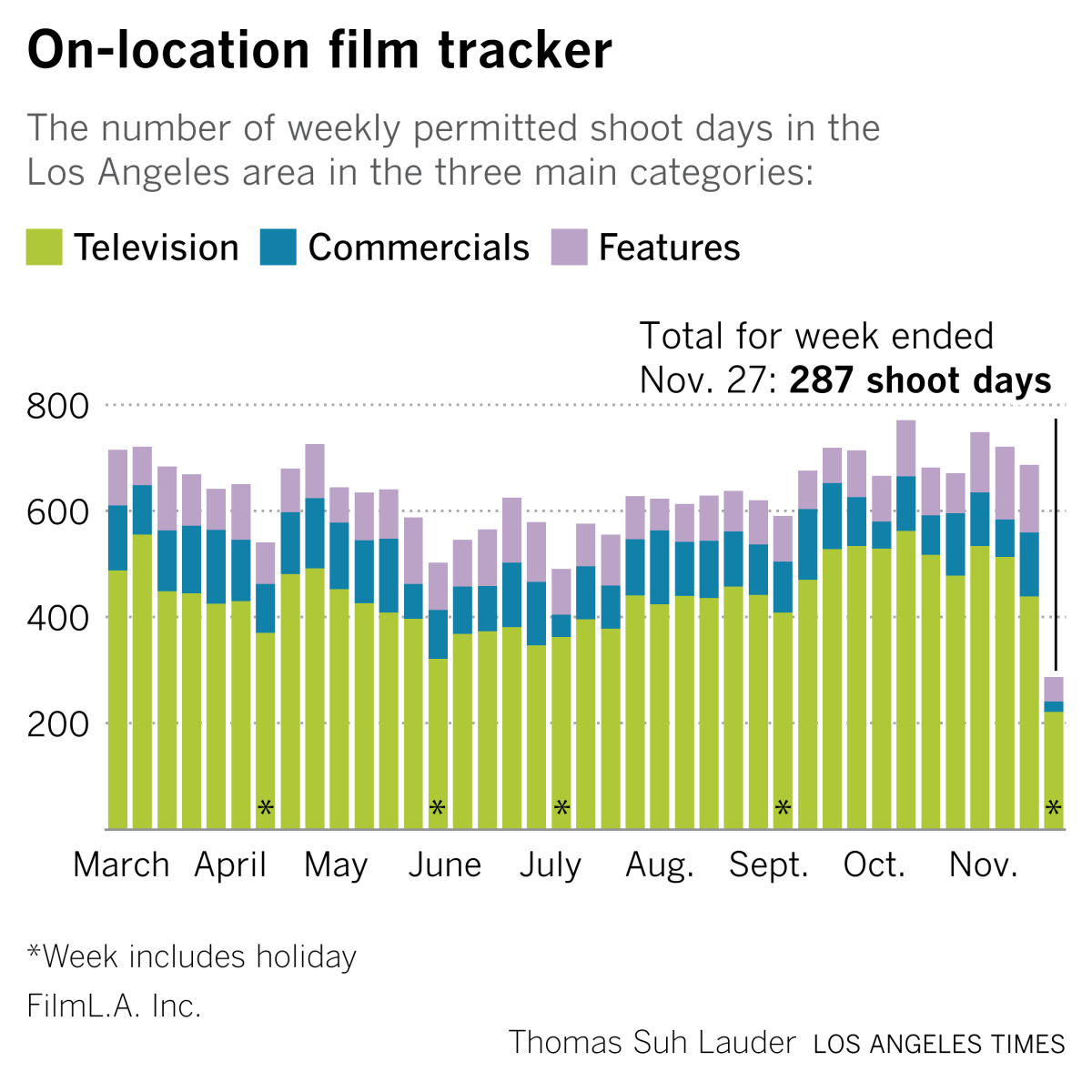Bob Iger knows creativity is Disney’s core. What that might mean for the studio

- Share via
Welcome to the Wide Shot, a newsletter about the business of entertainment. Sign up here to get it in your inbox.
Hollywood had a heck of a post-Thanksgiving news dump Monday as Bob Iger graced the Disney lot, Warner Bros. lost another creative partner and Mark Burnett stepped down from Amazon/MGM. Chaos reigns!
The Bob has landed
Bob Iger’s first day back on Walt Disney Co.’s Burbank lot was always going to be a bit of a humblebrag moment for the returning chief executive.
“Filled with gratitude and excitement to be back,” he said in a post on Twitter, accompanied by a photo of the Disney Legends Plaza and the Michael D. Eisner Building, with its famed columns that pay homage to “Snow White and the Seven Dwarfs.”
Ahead of a highly anticipated town hall, he shook hands with division heads and smiled at employees while pop covers of classic Disney earworms played. He kicked off his remarks by quoting lyrics from an apt “Hamilton” tune: “What’d I Miss?” (“There is no more status quo. But the sun comes up and the world still spins.”)
The timing of his arrival is notable, coming just a week after Disney’s now-infamous Sunday night Changing of the Bobs and his subsequent firing of Bob Chapek’s longtime deputy and distribution czar Kareem Daniel.
During a Q&A session with “ABC7 Eyewitness News” co-anchor Leslie Sykes, Iger touched on some existential, big picture issues.
He dismissed rampant rumors about selling the company to Apple as “pure speculation,” which, for what it’s worth, naturally leads to even more speculation. He emphasized the need to answer Wall Street’s escalating demands for streaming profits, not just subscriber growth, a stark change from the industry’s raison d’etre when he stepped down in February 2020. He suggested that cost-cutting measures, such as the hiring freeze instituted by Chapek, would remain in place.
There is plenty to address when thinking about what Disney will eventually look like during and after the era of Iger: the Squeakuel. Will he sell ESPN? Will he buy out Comcast’s Hulu stake early, or wait until the deadline? By the way, who’s going to run Disney when Iger leaves, anyway?
But getting lost in the parlor games and corporate intrigue is the thing that really makes Disney tick and has been its reason for being since Walt and Roy O. Disney founded the company in 1923.
You know, that little thing known as the movie business.
It’s the spring from which all, or nearly all, Disney’s storied franchises flow. There’s no Cinderella Castle without “Cinderella.” There are no cruise lines without “Steamboat Willie.” There’s no Elsa merch without “Frozen.” Theatrical film (now lumped under the banner of “content” industrywide) was the center of Walt’s famed illustration of Disney’s business model, since co-opted by “flywheel” evangelists everywhere.
Iger knows this better than anyone.
Speaking to the troops, he discussed it under the broader heading of creativity, describing it as one of his top priorities and stressing the need for quality over quantity.
“I think a number of you who have worked with me and know me know that I’m obsessed with [creativity], but I’m obsessed with it for a reason,” Iger said. “It is what drives this company. Every transaction that occurs at this company emanates from some form of creativity, and therefore it is my No. 1 priority. It is the focus. It’s not about how much we create; it’s about how great the things are that we do create.”
As if to highlight the challenges facing Iger in his return, Disney’s film studio just suffered its second major animated flop in a row: the sci-fi adventure “Strange World,” which grossed a weak $18.7 million in the U.S. and Canada over the long Thanksgiving weekend. After $180 million in production costs and additional millions in marketing, the film is expected to lose some $100 million from its theatrical run, according to analysts. This comes after “Lightyear” flopped in theaters with a global total of $226 million. Both were met with lukewarm reviews, at least compared with what Disney is used to.
The Mouse House has suffered lulls in the animation business before, and much worse ones at that. When Iger was named CEO the first time in 2005, the company’s animation division was a shambles, especially compared with the string of hits in the late 1980s-to-’90s that came to be known as the Disney Renaissance. That was the year of “Chicken Little” and the year after “Home on the Range.” Compared with that, the difficulties facing Iger in his return to Disney about 17 years later feel almost tame. But they’re real, nonetheless.
It’s not just animation where Disney’s film business faces questions, but across its enviable portfolio of franchises.
Is Disney’s live-action film business going to take risks in theaters by releasing movies other than 20th Century titles and remakes of its animated classics? We’ll see how “Haunted Mansion” does next year. Lucasfilm is cranking out well-received TV shows, but the next “Star Wars” movie isn’t expected until 2025. Whatever it is, there’s going to be immense pressure for it to be good.
Marvel is heading into Phase 5 after the success of “Black Panther: Wakanda Forever” but also amid worries about the manageability of the expanding MCU. Then there’s the perennial James Cameron question. Can “Avatar: The Way of Water” justify its immense production budget, let alone the three more sequels Disney has planned?
And while creativity is key, it also matters how Disney films are presented to audiences.
Disney brand loyalty is unmatched in the entertainment business. But that cuts both ways. Because the company pivoted so hard to streaming, and used its movie business to do it, Disney’s sophisticated fans know they only have to wait a little while before the latest animated film comes to the streaming service. And before blaming COVID-19 for keeping families out of multiplexes, remember that Universal and Illumination Entertainment’s “Minions: The Rise of Gru” grossed more than $920 million in box office sales worldwide this year.
Iger’s predecessor Chapek made no apologies for using new movies to boost Disney+ subscriptions during the pandemic, even as theaters were making a comeback, including with the streaming release of Pixar’s “Turning Red.” Chapek liked to say he “let the consumer be our guide.” But consumers are generally going to want things to be cheap and convenient, and that’s not necessarily a good business model for Disney.
There’s an increasingly convincing school of thought that says movies like the hugely popular “Hocus Pocus 2” would be more valuable to Disney+ if they were hits in theaters first. How much revenue did Disney miss out on by sending “Hocus Pocus 2” and the star-studded sequel “Disenchanted” directly to Disney+?
Speaking at the Code Conference in September, Iger said he thinks the movie business is simply not going back to 2019 levels. It’s just going to be a smaller business, he said. COVID-19 lockdowns left a “permanent scar.” That might end up being a self-fulfilling prophesy.
Stuff we wrote

— More on Disney’s Bob Swap 2022. Iger’s tallest order of all may be the one that he has struggled with for years: coaching his own replacement. Plus: Everything to know about Disney’s CEO shake-up and its effect on the entertainment giant.
— ‘Dune’ film producer Legendary moves distribution deal to Sony from Warner Bros. It’s the latest creative partner to leave Warner Bros., following the departure of Christopher Nolan to Universal, James Wan to Blumhouse and Walter Hamada to Paramount.
— Murder, fraud and sex tapes: Why Hulu and other streamers are cashing in on true crime. Audiences are spending hours rehashing true-crime stories, drawn to realism and nostalgia associated with ripped-from-the-headlines stories.
— Will Smith is on ‘probation’ with Black Hollywood. But it may not last much longer. The slap still stings. Only now, the spirited debates that erupted for several weeks following the Oscars have been replaced with a more subdued discomfort, one that is more protected than public.
Number of the week

Netflix doesn’t report box office figures for the movies it puts in theaters. But “Glass Onion: A Knives Out Mystery” is estimated to have grossed $13.3 million during the long holiday weekend, putting its likely total seven-day theatrical run at about $15 million in ticket sales. Not bad for a one-week release in only 700 theaters. Clearly Netflix is leaving gravy on the table by not giving Rian Johnson’s “Knives Out” sequel a full big-screen push, though how much is truly anyone’s guess.
The Hollywood Reporter estimated that the film could have grossed $40 million to $50 million from a normal opening weekend. The Ankler put the weekend-that-could’ve-been at $30 million. Perhaps they’re right. The first one, which came out in 2019, grossed more than $300 million worldwide, in a spectacular result for an original film aimed at adults.

But that’s just not what Netflix seems to be interested in, at least not right now. Rather, co-Chief Executive Ted Sarandos has made it clear that the company uses theatrical releases as part of its marketing to get people excited about high-profile films that go to its streaming service. Banner headlines proclaiming the film’s stellar theatrical run help with that goal. “Glass Onion” arrives on Netflix in less than a month.
Netflix last year secured a $450-million deal for the rights to two “Knives Out” sequels, including this one. Whatever the movies do to drive subscriber signups and prevent cancellations, it’ll have to be enough to justify that hefty price tag.
For all we know, Netflix could change its tune on theaters in a week or two. That’s what happened with advertising and crackdowns on password sharing. Theater owners privately say they were led to believe that the “Glass Onion” release (along with the debut of “Bardo” in Mexico) was meant to test potential theatrical strategies. However, Sarandos undermined that notion on the company’s most recent earnings call. Will Johnson’s $19,000 per-screen average alter Sarandos’ thinking? Who knows. It wouldn’t be the first time movie theater operators engaged in wishful thinking.
Best of the web (and more)...
— Risky business: How colleges and sports-betting companies ‘Caesarized’ campus life. (New York Times)
— Long live the mall food court! (L.A. Times)
— James Cameron wants you to know that “Avatar 2” is “very f—ing” expensive. (GQ)
— Amazon’s $1 billion theatrical movie push. (Bloomberg)
Film shoots
Here are FilmLA’s latest numbers for on-location shoots in Los Angeles. It was a holiday week, so ...

... things were quiet.
Finally ...
My music to write to this week: Colin Stetson’s soundtrack for Searchlight’s “The Menu.” Between this and “White Lotus Season 2,” it’s been a good year for eerie film and TV music. Send me your favorites!
Inside the business of entertainment
The Wide Shot brings you news, analysis and insights on everything from streaming wars to production — and what it all means for the future.
You may occasionally receive promotional content from the Los Angeles Times.




